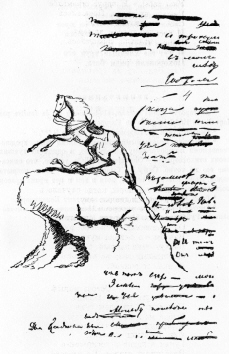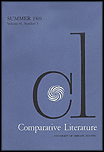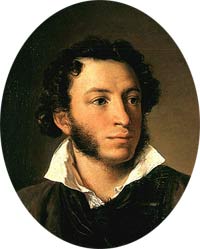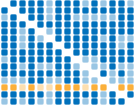МЕДНЫЙ ВСАДНИК (ВСТУПЛЕНИЕ) (Russian)
ПЕТЕРБУРГСКАЯ ПОВЕСТЬ
На берегу пустынных волн
Стоял он, дум великих полн,
И вдаль глядел. Пред ним широко
Река неслася; бедный чёлн
По ней стремился одиноко.
По мшистым, топким берегам
Чернели избы здесь и там,
Приют убогого чухонца;
И лес, неведомый лучам
В тумане спрятанного солнца,
Кругом шумел.
И думал он:
Отсель грозить мы будем шведу,
Здесь будет город заложен
На зло надменному соседу.
Природой здесь нам суждено
В Европу прорубить окно,[1]
Ногою твердой стать при море.
Сюда по новым им волнам
Все флаги в гости будут к нам,
И запируем на просторе.
Прошло сто лет, и юный град,
Полнощных стран краса и диво,
Из тьмы лесов, из топи блат
Вознесся пышно, горделиво;
Где прежде финский рыболов,
Печальный пасынок природы,
Один у низких берегов
Бросал в неведомые воды
Свой ветхой невод, ныне там
По оживленным берегам
Громады стройные теснятся
Дворцов и башен; корабли
Толпой со всех концов земли
К богатым пристаням стремятся;
В гранит оделася Нева;
Мосты повисли над водами;
Темно-зелеными садами
Ее покрылись острова,
И перед младшею столицей
Померкла старая Москва,
Как перед новою царицей
Порфироносная вдова.
Люблю тебя, Петра творенье,
Люблю твой строгий, стройный вид,
Невы державное теченье,
Береговой ее гранит,
Твоих оград узор чугунный,
Твоих задумчивых ночей
Прозрачный сумрак, блеск безлунный,
Когда я в комнате моей
Пишу, читаю без лампады,
И ясны спящие громады
Пустынных улиц, и светла
Адмиралтейская игла,
И, не пуская тьму ночную
На золотые небеса,
Одна заря сменить другую
Спешит, дав ночи полчаса.[2]
Люблю зимы твоей жестокой
Недвижный воздух и мороз,
Бег санок вдоль Невы широкой,
Девичьи лица ярче роз,
И блеск, и шум, и говор балов,
А в час пирушки холостой
Шипенье пенистых бокалов
И пунша пламень голубой.
Люблю воинственную живость
Потешных Марсовых полей,
Пехотных ратей и коней
Однообразную красивость,
В их стройно зыблемом строю
Лоскутья сих знамен победных,
Сиянье шапок этих медных,
На сквозь простреленных в бою.
Люблю, военная столица,
Твоей твердыни дым и гром,
Когда полнощная царица
Дарует сына в царской дом,
Или победу над врагом
Россия снова торжествует,
Или, взломав свой синий лед,
Нева к морям его несет
И, чуя вешни дни, ликует.
Красуйся, град Петров, и стой
Неколебимо как Россия,
Да умирится же с тобой
И побежденная стихия;
Вражду и плен старинный свой
Пусть волны финские забудут
И тщетной злобою не будут
Тревожить вечный сон Петра!
[1] Альгаротти где-то сказал: «Pétersbourg est la fenêtre par laquelle la Russie regarde en Europe»
[2] Смотри стихи кн. Вяземского к графине З***
| Uploaded by | Répás Norbert |
| Source of the quotation | http://rvb.ru/pushkin/ |
| Publication date | 1833 |
 |
|
The bronze horseman (Introduction) (English)
A Petersburg Tale, 1833[1]
There, by the billows desolate,
He[2] stood, with mighty thoughts elate,
And gazed; but in the distance only
A sorry skiff on the broad spate
Of Neva drifted seaward, lonely.
The moss-grown miry banks with rare
Hovels were dotted here and there
Where wretched Finns for shelter crowded;
The murmuring woodlands had no share
Of sunshine, all in mist beshrouded.
And thus He mused:
"From here, indeed
Shall we strike terror in the Swede;
And here a city[3] by our labor
Founded, shall gall our haughty neightor;
'Here cut'--so Nature gives command--
'Your window through on Europe; stand
Firm-footed by the sea, unchanging!'
Ay, ships of every flag shall come
By waters they had never swum,
And we shall revel, freely ranging."
A century--and that city young,
Gem of the Northern world, amazing,
From gloomy wood and swamp upsprung,
Had risen, in pride and splendor blazing.
Where once, by that low-lying shore,
In waters never known before
The Finnish fisherman, sole creature,
And left forlorn by stepdame Nature,
Cast ragged nets--today, along
Those shores, astir with life and motion,
Vast shapely palaces in throng
And towers are seen: from every ocean,
From the world's end, the ships come fast,
To reach the loaded quays at last.
The Neva now is clad in granite
With many a bridge to overspan it;
The islands lie beneath a screen
Of gardens deep in dusky green.
To that young capital is drooping
The crest of Moscow on the ground,
A dowager in purple, stooping
Before an empress newly crowned.
I love thee, city of Peter's making[4];
I love thy harmonies austere,
And Neva's sovran waters breaking
Along her banks of granite sheer;
Thy traceried iron gates; thy sparkling,
Yet moouless, meditative gloom
And thy transparent twilight darkling;
And when I write within my room
Or lampless, read--then, sunk in slumber,
The empty thoroughfares, past number,
Are piled, stand clear upon the night;
The Admiralty spire[5] is bright;
Nor may the darkness mount, to smother
The golden cloudland of the light,
For soon one dawn succeeds another
With barely half-an-hour of night.
I love thy ruthless winter, lowering
With bitter frost and windless air;
The sledges along Neva scouring;
Girls' cheeks--no rose so bright and fair!
The flash and noise of balls, the chatter;
The bachelor's hour of feasting, too;
The cups that foam and hiss and spatter,
The punch that in the bowl burns blue.
I love the warlike animation
On playing-fields of Mars[6]; to see
The troops of foot and horse in station,
And their superb monotony;
Their ordered, undulating muster;
Flags, tattered on the glorious day;
Those brazen helmets in their luster
Shot through and riddled in the fray.
I love thee, city of soldiers, blowing
Smoke from thy forts; thy booming gun;
-- Northern empress is bestowing
Upon the royal house a son!
Or when, another battle won,
Proud Russia holds her celebration;
Or when the Neva breaking free
Her dark-blue ice bears out to sea
And scents the spring, in exultation.
Now, city of Peter, stand thou fast,
Foursquare, like Russia; vaunt thy splendor!
The very element shall surrender
And make her peace with thee at last.
Their ancient bondage and their rancors
The Finnish waves shall bury deep
Nor vex with idle spite that cankers
Our Peter's everlasting sleep!
[1] The occurrence related in this tale is based on fact. The details of the flood are taken from the journals of the day. The curious may consult the account composed by V. N. Berch.
[4] Pushkin added in a footnote: "See Prince Vyazemsky's poem to the Countess Z. Conversation of April 7, 1832." (The poem was dedicated to Princess E. M. Zavadovsky.)
[5] The spire on the roof of the building housing the Ministry of the Navy.
[6] The square in Petersburg on which military reviews took place.
| Uploaded by | Répás Norbert |
| Publisher | Duke University Press on behalf of the University of Oregon,DOI: 10.2307/1769025 |
| Source of the quotation | Pushkin's Bronze Horseman. The Story of a Masterpiece by Waclaw Lednicki,Vol. 9, No. 3 (Summer, 1957) |
| Bookpage (from–to) | 141-143 |
| Publication date | 1957 |
 |
|






